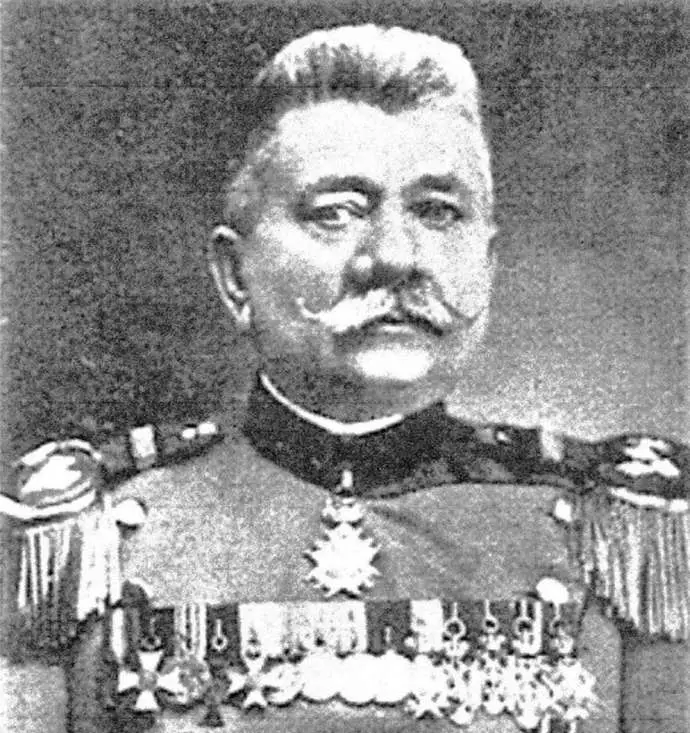In 1918, following the end of WWI, the Serbian army officer Stevan Šabić and some of the Serbian army troops that have been captured by Austro-Hungarians during the war made a stop in Ljubljana on their way to Serbia and prevented its plunder by retreating military gangs and its planned occupation by the advancing Italian forces. Lieutenant Colonel Švabić, having the highest rank in the land he found himself in, also prevented the capture and plunder of Trbovlje and some other Slovenian towns.
In the chaos that followed the end of the WWI the newly established State of Serbs Croats and Slovenes (a month later the state embraced the Serbian king becoming a Kingdom itself) was not yet recognised and did not have its own army presence in all of the territories it claimed, especially in Slovenia, which used to be part of the now defeated Austrian Empire. With no troops present, the land was open for post-war looting, violence and changing of geopolitical circumstances which could potentially affect the new border agreements which were soon to follow.
Post-war Hungarian military violence against the Slovenian majority population in Prekmurje ended with the Paris Peace Conference in 1919, where Hungary was forced to sign the Treaty of Trianon, which granted people the right to self-determination and allowed Prekmurje to join the Kingdom of SCS.
In Maribor, where on October 30, 1918 the German city council declared lower Styria (Štajerska) as part of the Austrian territory, General Rudolf Maister, who managed to mobilise 3,000 troops, disarmed the German guard on November 23, then continued a military campaign for Slovenian Styria and Carinthia.
On the Western border, however, things were a bit more complicated. The “people’s self-determination” principle that guided the Treaty of Trianon of the Paris Peace Conference was forgotten here in favour of the secret 1915 Treaty of London, which promised Italy large territorial gains in case of the Entente Powers’ victory. The controversial treaty became public after Lenin publicly denounced it in 1917.
Nevertheless, about 1/3 of the lands where Slovenians lived went to Italy, including the entire Southern and Northern littoral right up to the peak of Triglav. And in the post-war chaos with the central part of the country undefended, Italians turned their eyes on the capital, Ljubljana, as well.
On November 6, 1918, a Lieutenant Colonel of the Serbian army, Stevan Švabić, and other Serbian prisoners of war made a stop in Ljubljana after being released from Austrian war camps. According to Švabić’s account, Ljubljana train station was in a complete disorder: there was a train with 15 cars full of armed Hungarians on a nearby track and several other trains with armed militias present at the station. Immediately after his arrival at the station he was already being looked for by Adolf Ravnikar, sent to find help by the city authorities. Ravnikar explained the situation as alarming: out of control Austrian soldiers were returning from the front, while the Italian army followed them. If immediate help was not found, gangs would ransack the city and empty the military depots.
Understanding the urgency, Švabić gathered his troops to restore some basic order in the city, while prepared to address the problem of the advancing Italian army which had by November 10 already reached Logatec and was heading towards Vrhnika.
By November 14, Švabič had about 2,000 men and probably got a permission from Zagreb, to send the Italian commanding officer in Vrhnika an ultimatum not to continue the advance of the Italian troops further to Ljubljana, as he would have find “use of weapons on allied forces most regretful”.
The ultimatum, which was based on a pretext that the allied forces, the Serbs, had already taken control of the surrendered Austrian territories, stirred a lot of confusion on the Italian side, which must have concluded that perhaps the Serbian army had indeed managed to reach that far north at such a short notice. Furthermore, additional pressure on the Italians to retreat came from the French, who were called to do so by the Serbs.
In the days that followed, the Italian army retreated from Vrhnika while only six days after his ultimatum Stevan Švabić was called to Belgrade, probably due to a presumed violation of the chain of command by signing his name on the document which threatened an allied country with the use of weapons.
In 1930 Stevan Švabić was awarded a deserving citizen medal by the City of Ljubljana and two streets in Slovenia are named after him: Švabićeva ulica in Trnovo, Ljubljana and Švabićeva ulica in Vrhnika.






